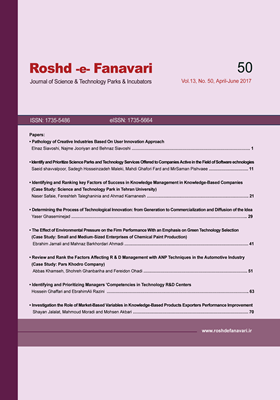Identifying and Ranking Key Factors of Success in Knowledge Management in Knowledge-Based Companies (Case Study: Science and Technology Park in Tehran University)
Subject Areas : مديريت دانش
naser safaei
1
*
![]() ,
fereshte thaleghani
2
,
Ahmad Kiamanesh
3
,
fereshte thaleghani
2
,
Ahmad Kiamanesh
3
1 - K.N. Toosi University of Technology
2 -
3 -
Abstract :
Today, knowledge- based companies as a key option to produce wealth in developing countries is responsible for explaining and modeling research and development processes and significantly contributes to diffusion innovation in industry. In fact, knowledge-based companies are considered important components of resistance economy and its realization. Its growth and development could bring in to resistance against economical invasions. Hence, identifying and ranking factors effecting implementation of knowledge management in such companies is research necessity which is discussed the current research. Now, there are 33 science and technology parks and over 2700 knowledge-based company in parks. Questionnaires are distributed among 70 knowledge-based companies in science and technology Park of Tehran University as the second superior park in country. In the current research, case study and field-data collection are used. Questionnaire is designed using Likert technique and it consists in 3 major factors, organization, human resource, and information technology, and 11 following criteria: objectives and perspectives, leadership, executives, application, software, infrastructure, organizational culture, financial and non-financial incentives, modeling and evaluating. Analyzing information, Cronbach's alpha 0.78 was obtained and using Freidman test and T-test. Among factors effecting successful implementation knowledge management, one can refer to objects and organizational respective as the most important factor and financial incentives as the lowest important factor. This conclusion is reasonable according to nature of knowledge –based companies.
1- متن قانون حمایت از شرکتها و مؤسسات دانشبنیان؛ آدرس سایت: http://daneshbonyan.isti.ir
2- سازمان گسترش و نوسازی صنایع ایران؛ آدرس سایت: http://tradedoc.itsr.ir/article/dic/di003-htm/
3- کارگاه ارزیابی و تشخیص صلاحیت شرکتهای دانشبنیان و نظارت بر اجرا؛ آدرس سایت: http://pub.daneshbonyan.ir
4- ليبوويتز، ترجمه سیدناصر علوی مدیریت دانش، انتشارات دانشگاه شهید باهنر کرمان، 1387.
5- امیرخانی، امیرحسین و عالی، سولماز و عسگری، فروغ، نگاهی به مدیریت دانش و عوامل مؤثر بر آن، ماهنامه ارتباط علمی، 1389.
6- ویلیام ال ميلر, لانگ دون موریس، مدیریت دانش, فناوری و نوآوری، ترجمه علیرضا مهاجری، انتشارات جهاد دانشگاهی، 1383.
7- بهترينژاد، الهام، مطالعه نقش مؤلفههاي راهبردي و تاكتيكي مديريت دانش بر هوش سازماني، پاياننامه كارشناسيارشد، دانشكده مديريت و حسابداري دانشگاه سيستان و بلوچستا ن، 1390.
8- سرلك، محمدعلي و مقدسان، محمدحسين و روستايي، محمد، فناوري اطلاعات تسهيلكنندههاي براي ارتقاء مهارتهاي سازمان، 1389.
9- نکودری مریم، یعقوبینور محمد، بررسی عوامل تسهیلکننده مدیریت دانش در سازمان مدیریت بحران، پژوهشهای مدیریت عمومی، سال چهارم، شماره سیزدهم، صفحه 95-119، پاییز 1390.
10- اولیا محمدصالح و همکاران، تعیین و اولویتبندی عوامل مؤثر بر موفقیت مدیریت دانش در پارکهای علم و فناوری، فصلنامه تخصصی پارکها و مراکز رشد، سال هفتم، شماره 27، تابستان 1390.
11- دهکردی, زهرا؛ زهرا علی بابایی و مهدی دهقانی، عوامل کلیدی موفقیت پروژههای مدیریت دانش، نخستین کنفرانس بینالمللی پارادیمهای نوین مدیریت هوشمندی تجاری و سازمانی، تهران، دانشگاه شهید بهشتی، ۱۳۹۵.
http://www.civilica.com/Paper-OICONFERENCE01-OICONFERENCE01_623.html 12- تولایی, روحاله و روزبه فدایی، شناسایی و اولویتبندی عوامل اساسی موفقیت در پیادهسازی مدیریت دانش (مطالعه موردی: شرکت توزیع برق استان کردستان)، دومین کنفرانس بینالمللی مدیریت و علوم انسانی، استانبول- کشور ترکیه، مؤسسه مدیران ایدهپرداز پایتخت ویرا، ۱۳۹۵.
http://www.civilica.com/Paper-ICMHCONF02-ICMHCONF02_176.html 13- صفیری, نوشین، بررسی و ارزیابی عوامل کلیدی موفقیت مدیریت دانش در صنعت بیمه، دومین کنفرانس بینالمللی مدیریت و علوم اجتماعی، دبی، مؤسسه مدیران ایدهپرداز پایتخت ویرا، ۱۳۹۵.
http://www.civilica.com/Paper-ICMSCONF02-ICMSCONF02_089.html 14- محمدی احمر, مریم و مریم پرویزی، بررسی و شناسایی عوامل مؤثر در پیادهسازی سیستم مدیریت دانش و نقش آن در مراکز تربیت معلم، دومین همایش ملی تربیت معلم، اصفهان، دانشگاه فرهنگیان، دانشگاه اصفهان، ۱۳۹۵.
http://www.civilica.com/Paper-CPHE02-CPHE02_130.html 15- Mohamed,K. Y., Abdul-Hameed, J. A., & Mostafa, A. M. The comparrativeimportance of the architectural and urban potentials of knowledge cities.Proceedings of the 6th Knowledge Cities World Summit (pp. 68-79). Istanbul: Lookus Scientific, 2013.
16- Nakata I., Takeuchi H. the knowledge creating company, How Japanese companies create the Dynamics of Innovation. Oxford University press; 1995.
17- Snowden, D., “Liberating knowledge”, Liberation knowledge,1 (1), PP. 6-19, 2000.
18- International Journal of Information, Security and System Management, Vol.2, No.2, PP. 169-182, 2013.
19- Chin- T sang, the relationship between knowledge management enablers and performance HO, Vol.109, No.1, PP.98-117, 2009.
20- Frank Lindner, Andreas Wald, Success factors of knowledge management in temporary organizations, International Journal of Project Management, 2010.
21- Skyrme, David J. and Amidon, Debra M. Creating the Knowledge-based Business, London: Business Intelligence, 1997.
22- Davenport, T., De Long, D. and Beers, M. "Successful Knowledge Management Projects", Sloan Management Review, Vol. 39 No. 2, pp. 43-57, 1998.
23- Chourides, P., Longbottom, D., Murphy, W. "Excellence in knowledge Management: an Empirical Study to Identify Critical Factors and Performance Measures", Measuring Business Excellence", Vol. 7 No.2, pp. 29-45, 2003.
24- Hung, Y.C., Huang, S.M Lin, Q. Tsai, M.L. Critical Factors in Adopting a Knowledge Management System for the Pharmaceutical Industry, Vol.105, No.2, pp. 164-168, 2005.

